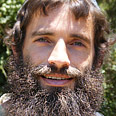
It’s the middle of summer and it’s hot. We’re in the midst of our vacation. About 30 settler children leave the community of Beit-El aboard a municipal bus and travel to the nearby town, Ramallah. The minibus enters town, crosses it, and climbs up a narrow and steep road until it reaches a Palestinian hotel. The children go into the lobby screaming with joy, and from there they head directly to the swimming pool, where they’ll enjoy themselves alongside Palestinian children.
This story is not taken from the distant future, but rather, from the not-so-distant past. It was the end of the 1970s and beginning of the cheerful 1980s: Back then, war was about playfully “fighting” Palestinian children at the pool. We did not understand their language, but we were able to communicate without words.
This pre-Intifada and early coexistence chapter is the forgotten story of my childhood.
And here is yet another story about those days: A woman who today is happily married to one of the settler leaders in Judea and Samaria took driving lessons with a Palestinian instructor in one of the West Bank towns. Try to imagine the small details: How she leaves the house in the morning with her well-known husband, gets into the Arab instructor’s vehicle, and drives off. Just him and her, as she gently hold the wheel while entrusting her life in his hands. And she wasn’t the only woman to do it. Back then, many men and women learned how to drive in Arab towns.
I think back, with a sense of longing, to the buds of mutual respect that were growing between us, the Jewish settlers in Judea and Samaria and the Palestinians, and my heart aches.
On many occasions, my mother took me shopping in Ramallah, where we drove through the streets en route to choosing tiles for our house. There was no fear in the air. I stayed alone in the car, yet nobody thought of initiating a pogrom against the little kid. I recall how we used to stop for fuel at the gas stations of al-Bireh, Ramallah. How we traveled in their cabs and purchased goats from Palestinian shepherds. Thousands of Palestinian laborers worked in Jewish community and made an honorable living after the economic nadir they suffered under Jordanian rule.
This was reality until the stone throwing started, followed by the Molotov cocktails, and finally the gunshots and shells and our military operations.
Mutual respect
But what was happening on our end before the Intifada? What sort of sensations accompanied the woman en route to her driving lesson? What did we feel and think while we were having fun in the pool with the Palestinians? What enabled all of this to happen? It was an atmosphere of familiarity and an initial sense of accepting the other that were prevalent in Judea and Samaria back then. It was a healthy nationalism, devoid of the darkness of extreme nationalism; it was a moment of goodwill that faded away.
Rabbi Nachman of Breslov said: “If you believe that things can be broken, believe they can be fixed”. I completely believe that if we invest our energies and talents in becoming mutually familiar with our Palestinian cousins, if we learn to respect them and they learn to respect us, if we accept their presence here and they accept our presence – we’ll be able to spare the settlement enterprise another round of destruction and another expulsion. With mutual respect we will not have to raze any Jewish communities or expel any Palestinians.
It is precisely us, the settlers, who meet the Palestinians on the ground every day, who can serve as the gateway to peace. We need to laud economic cooperation, resume our shopping trips in Palestinian towns, and hold meetings with them. The rabbis of communities located near Palestinian villages can certainly meet with Arab dignitaries. Ecological cooperation already materialized, only a few months ago. Sewage problems in Ein Yabrud and Ofra prompted the joint construction of a sewage treatment plant.
Quite a few settlers, many of them young ones, are interested in embarking on the path of peace. However, the process has to be parallel. The Palestinians also have to get to know us, recognize us, and educate their children to know that we are no monsters. Once that happens, we’ll be able to live in peace here, just like it (almost) used to be in the early 1980s.
Gush Etzion resident Nachom Pachnik is a poet and holds yoga and laughter workshops.















